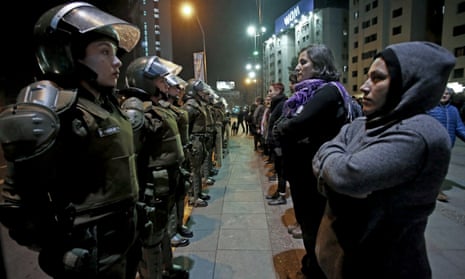Seven years ago, a wave of student protests paralyzed schools and universities across Chile, eventually forcing the president, Sebastián Piñera, to sack his education minister and promise massive investment in an educational system that was seen as unduly focused on making a profit.
This year, with Piñera back in power, a new generation of activists has launched a wave of strikes, occupations and protests against sexual harassment and sexual discrimination within the country’s universities.
“This movement was born from the fury that we have accumulated as women and feminists over many years. 2011 was an awakening, but it wasn’t feminist – today we are coming from a different angle,” said Valentina Gatica Gómez, president of the student federation at the Austral University of Chile in the southern city of Valdivia, where the first of the protests erupted in April.
Since then, more than 25 higher education institutions the length of the country have been paralyzed by protests and sit-ins.
Chile’s #MeToo moment comes as the women’s movement in Latin America has taken on new momentum, challenging violence against women and pushing for reform of the region’s draconian abortion laws.

In the neighbouring country of Argentina, a historic congressional ruling in Argentina in June paved the way for the decriminalisation of abortion. Meanwhile, across the region, campaigners have targeted violence against women and sexual abuse with the #NiUnaMenos (not one fewer woman) and #Cuéntalo (roughly translated as “tell your story”) campaigns.
The strikes reached the capital, Santiago, when sexual harassment allegations were leveled against one of the country’s most prominent legal scholars, the University of Chile law professor Carlos Carmona.
The university suspended him for three months for “lack of integrity”, but said that its sexual harassment rules only covered relationships among employees, not teachers and students. Carmona has not publicly commented on the case.
Within days, protesters had occupied the law faculty, hanging strings of bras across gateways and painting slogans on the wall in thick red paint.

From the initial focus on sexual harassment, the protesters are now calling for universities to address language used in classrooms, the lack of female authors on reading lists, inadequate protocols for dealing with accusations of sexual harassment and abuse, and the lack of women in positions of authority.
Francisca Ochoa, the communications secretary of the University of Chile’s student federation, said: “We want to create a society in which men and women are respected equally: this doesn’t end with condemnations of abuses – we want to ensure that there is no position of privilege or power for any man over a woman.”
Polls show broad support the strikes, but that does not necessarily mean Chileans have adopted all of the protesters’ causes: according to one recent poll, just 2% of respondents consider themselves feminists, while 27% define themselves as machista.
Piñera has promised to address some of the students’ demands, including amending the constitution to establish the state’s “duty to promote and guarantee equal rights, duties and dignity between men and women”.
He has also promised to promote the participation of women in positions of authority – although his cabinet includes 16 men and just seven women.
But many protesters are calling for the president to fire to ministers: the education minister, Gerardo Varela, is accused of belittling their complaints while the health minister, Emilio Santelices, angered activists by convincing the constitutional court to weaken a new law legalizing abortion to allow clinics the right to deny terminations on moral grounds.
The student movement has seen some criticism for its origins among Chile’s educated elite, but Gatica Gómez is confident it can leap the boundary between academic life and civil society.
“Women are taking note in every part of the country, and this points to something larger than just a student movement,” she said. “Many of us are starting to reflect on our experiences, and this will expand our movement’s reach into other sectors of society.”
Many faculties and institutions across the country are still being occupied by protesters, and the student leaders are regrouping before a new wave of protests beginning on 25 July with a nationwide march in favour of access to safe abortion.
